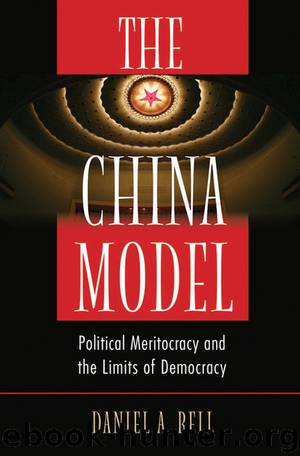China Model by Bell Daniel A.;

Author:Bell, Daniel A.;
Language: eng
Format: epub
Publisher: Princeton University Press
Published: 2014-12-31T16:00:00+00:00
A Referendum against Electoral Democracy
The political history of Chile in the second half of the twentieth century offers food for thought. Army General Augusto Pinochet took power on 11 September 1973 in a violent coup d’état that deposed the democratically elected President Salvador Allende. For the next sixteen years, Pinochet ruled as Supreme Leader of the Nation. Pinochet presided over a period of substantial economic growth, but he faced increased pressure to open up politically. In addition to domestic pressure for reform, the international context had changed: the Soviet Union under Mikhail Gorbachev—the supposed sponsor of the communist “subversives”—had itself initiated the glasnost and perestroika democratic reforms. In 1987, Pope John Paul II visited Chile and called on religious forces to actively fight for the restoration of democracy. The following year, Pinochet succumbed to pressure and called a national referendum on his rule. If the majority voted “yes,” Pinochet would have remained in power for another eight years.
The referendum was heavily stacked in Pinochet’s favor. In the pre-Internet age, the opposition had only fifteen minutes of media time per night for twenty-seven days to make its case for “no.” Yet Pinochet lost the referendum, with nearly 56 percent of the population voting “no.” As depicted in the Oscar-nominated film No, the opposition won (at least partly) by employing lighthearted marketing techniques that pointed the way to a “happy” future rather than by reminding the population of the Pinochet regime’s grim history of human rights abuses.58 Following his defeat at the polls, Pinochet wanted to retain power, but he was pushed out of power when the heads of the branches of Chile’s military refused to support him, thus paving the way for the restoration of democracy in that country.
In the case of China, leading political scientists predict that China will need to implement some form of electoral democracy and multiparty rule (at the top) within the next decade or two.59 If China does face a major constitutional moment, however, there is a more desirable and, arguably, more realistic, possibility. What if the CCP were to follow Pinochet’s example and call a referendum, asking the Chinese people to vote “yes” in favor of a more open form of political meritocracy, with more freedom of political speech and more freedom to form social organizations, but without one person, one vote to choose top leaders and without the freedom to form political organizations that explicitly challenge CCP rule? A victory for the “yes” could provide an important element of democratic legitimacy to the system. Critics inside China alleging that the Chinese regime is fundamentally unstable or illegitimate because it lacks the support of the people would be silenced by the people, and the government need not worry about their social impact.60 A “yes” vote would also be a big coup for China’s soft power: the rest of the world would realize that the political system is indeed endorsed by the majority of Chinese citizens and sets a good model for political reform. The dominant
Download
This site does not store any files on its server. We only index and link to content provided by other sites. Please contact the content providers to delete copyright contents if any and email us, we'll remove relevant links or contents immediately.
| Anarchism | Communism & Socialism |
| Conservatism & Liberalism | Democracy |
| Fascism | Libertarianism |
| Nationalism | Radicalism |
| Utopian |
The Secret History by Donna Tartt(16706)
The Social Justice Warrior Handbook by Lisa De Pasquale(11502)
Thirteen Reasons Why by Jay Asher(7824)
This Is How You Lose Her by Junot Diaz(5819)
Weapons of Math Destruction by Cathy O'Neil(5068)
Zero to One by Peter Thiel(4858)
The Myth of the Strong Leader by Archie Brown(4806)
Promise Me, Dad by Joe Biden(4470)
Beartown by Fredrik Backman(4457)
How Democracies Die by Steven Levitsky & Daniel Ziblatt(4439)
Stone's Rules by Roger Stone(4434)
The Fire Next Time by James Baldwin(4364)
100 Deadly Skills by Clint Emerson(4103)
A Higher Loyalty: Truth, Lies, and Leadership by James Comey(4051)
Rise and Kill First by Ronen Bergman(4037)
The David Icke Guide to the Global Conspiracy (and how to end it) by David Icke(3908)
The Farm by Tom Rob Smith(3890)
Secrecy World by Jake Bernstein(3800)
The Doomsday Machine by Daniel Ellsberg(3748)
